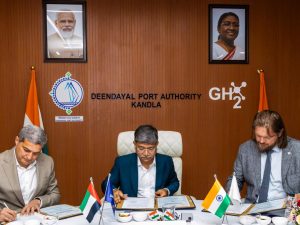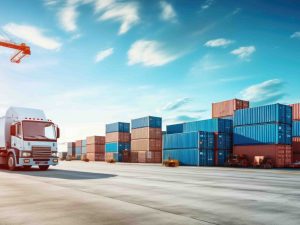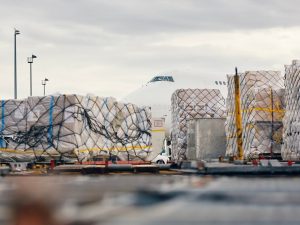DP World, the Deendayal Port Authority (DPA), and Nevomo have signed MoU to explore potential opportunities for cooperation in the development and implementation of a pilot project using Nevomo’s MagRail proprietary technology for the self-propelled movement of rail-based cargo and freight within the existing port ecosystems. DP World is leading efforts to introduce advanced freight technology aimed at transforming cargo movement in India. Deendayal Port Authority (DPA), a key multi-cargo port under the Government of India, is facilitating exploration of this technology at its terminal in Kandla to evaluate the feasibility of this futuristic freight transportation system. The initiative marks a significant step toward building faster, more efficient, and sustainable port-hinterland connectivity. This initiative is aligned with India’s National Logistics Policy and PM Gati Shakti agenda aimed at modernizing and integrating the country’s logistics infrastructure. The MoU was signed by Shri Sushil Kumar Singh, IRSME, Chairman of Deendayal Port Authority (DPA), Rizwan Soomar, CEO & Managing Director, Middle East, North Africa, India Subcontinent, DP World, and Przemek (Ben) Paczek CEO Nevomo Group BV along with other senior dignitaries in Kandla, Gujarat, on 15th July 2025. The MoU sets the framework for a 750-metre pilot project of MagRail technology at Deendayal Port. A first-of-its-kind initiative in India will demonstrate self-propelled freight movement within a live port environment. It aims to develop and implement MagRail-based solutions that enable autonomous, electric-powered wagons using linear motor technology on existing rail tracks, enhancing capacity, efficiency, and speed for containerized and bulk cargo while reducing costs and CO2 emissions, making the logistics systems greener, faster, and more interoperable.
Read More »‘GHIAL plans to expand capacity at terminal 1 and 2 by FY26’
Informing about GMR Hyderabad Airport’s expansion plans, Pradeep Panicker, CEO, GHIAL said, “The current cargo infrastructure at Hyderabad is undergoing significant expansion to meet growing demand. The Existing Cargo terminal-1 can handle 1,50,000 MT per year. It is being upgraded to double the existing capacity and, upon completion, will feature a state-of-the-art Domestic Terminal, an International Courier/Express Terminal, and a dedicated Export Perishables Terminal, all aimed at enhancing operational efficiency and customer satisfaction. Additionally, construction of the new Cargo Terminal 2 is in progress, substantially increasing overall handling capacity to 350,000 MT by end of FY26.”
Read More »ATL raises Rs 38.28Cr to build capacity, CFS &ICD
Allcargo Terminals Ltd (ATL) has announced a proposal to raise Rs. 38.28 Cr. through the issuance and allotment of up to 1,32,00,000 Fully Convertible Warrants to the Promoters/Promoter Group. The Board of Directors of ATL has approved the preferential allotment in its meeting held on July 15, 2025. Each warrant has a face value of ₹2 per share, at an issue price of Rs. 29 per warrant at a premium of Rs.27 per warrant, subject to shareholder and regulatory approvals. This issuance accounts for approximately 5% of ATL’s post-conversion equity share capital and is priced at a ~1% premium to the SEBI-defined floor price. This kickstarts ATL’s three year expansion plans. ATL has a current capacity of 8.3L TEUs annually across its seven facilities in five hubs that handle approximately 80% of India’s EXIM trade. ATL plans to augment its capacity to over 13L in the coming three years – by expanding some of its key facilities and by developing new CFS/ICD facilities. This strategic move is in line with ATL’s long-term growth roadmap and will support the company’s multi-location infrastructure expansion at Mundra and Nhava Sheva, Greenfield ICD at Farukhnagar and infra upgrades at existing facilities. Currently operating at 80–85% capacity utilisation, the expansion plans will enable the company to cater to future demand and consolidate its leading position in key logistics corridors.
Read More »Maharashtra to build India’s first offshore Airport in 2026
Maharashtra is all set to build India’s first offshore Airport and Mumbai’s third Airport near the upcoming Vadhavan Port. The construction work will begin in 2026 said, Chief Minister Devendra Fadnavis. “Maharashtra plans to build India’s first offshore airport near Vadhavan Port, an innovative solution to Mumbai’s chronic airport congestion, inspired by Japan’s Kansai International Airport, completed in 1994 on a man-made island after overcoming major engineering challenges,” said reports.
Read More »‘India’s scale, policy support & investment benefitting the sector’
Global companies are diversifying their manufacturing and sourcing bases across Asia due to the ever-evolving geo-political developments,” said, Huned Gandhi, Managing Director, Air & Sea Logistics at Dachser India. He added, “As a result, several countries including Vietnam, Thailand, Indonesia and India are being integrated more deeply into the global value chains. Each location offers distinct advantages, whether in terms of cost, infrastructure, trade agreements, or workforce capabilities. India is steadily positioning itself as a reliable long-term partner, especially in sectors such as automotive, pharmaceuticals, textile and garments and also electronics. While Southeast Asia has seen early traction due to proximity and existing trade ties, India’s scale, policy support and investment in logistics infrastructure are creating long-term advantages. This broader regional diversification is fostering a more resilient and multi-modal supply chain landscape across Asia.”
Read More »DPIIT selects Thiruvananthapuram & Kochi to improve logistics ops
Thiruvananthapuram and Kochi have been selected by the Department for Promotion of Industry and Internal Trade (DPIIT) from over 50 tier-2 and tier-3 cities across the country for the preparation of city logistics plans to reduce logistics costs, congestion and improve connectivity. “The State government has now proposed the Directorate of Urban Affairs as the nodal agency for coordinating activities related to the city logistics plans,” said reports. The city logistics plans are expected to be a comprehensive framework designed to optimise urban goods movement, reduce costs and minimise environmental impact. It will be a strategic plan designed to adequately address the urban freight and logistics needs of the city’s population and businesses to achieve economic growth with better quality of life and environment. The logistics plan will be prepared in a structure and format that can be easily integrated with the Comprehensive Mobility Plan (CMP) of the city. One of the focus areas will be in reducing urban emissions by optimising vehicle movement within cities through strategic routing and consolidation of freight. The plan will also prioritise efficiency by optimising goods movement, added reports.
Read More »KSH Infra plans to invest ₹550 crore in logistics park in Tamil Nadu
KSH INFRA announced plans to invest ₹550 crore in its second Park in Tamil Nadu. Strategically located in the high-growth Sriperumbudur-Oragadam belt, the upcoming park will be spread across approximately 60 acres of freehold land, offering a development potential of 1.6 million square feet. Situated with 600 meters of direct frontage on the abutting Other District Road, the park benefits from robust multimodal access. Its proximity to the Chennai–Bangalore Expressway (NE7), which is nearing completion, ensures fast-tracked connectivity to major industrial hubs, ports, and consumption centers, enabling manufacturing and allied industries. The Sriperumbudur–Oragadam corridor is already home to industry giants such as Hyundai, Danfoss, Flowserve, Essar Steel, Apollo Tyres, CEAT, Michelin, JK Tyre, Bridgestone, MRF, Foxconn, Flextronics, Dell, Samsung, Nokia, Salcomp, Jabil, the location is fast evolving into a multi-sectoral industrial cluster. The corridor’s strategic importance is further underscored by large-scale infrastructure developments currently underway, including the Chennai–Bangalore Expressway, Peripheral Ring Road, Greenfield Airport at Parandur, MMLP at Mappedu, and the Aerospace Park in Sriperumbudur. Together, these developments position the region as a high-potential node within the Chennai–Bangalore Industrial Corridor (CBIC). Additionally, the industrial-first development by KSH INFRA will cater to the evolving needs of global and domestic manufacturers, particularly across the automotive, electronics, and engineering sectors. Construction is planned to commence by March–April 2026 and is expected to generate over 1,500 jobs opportunities in the region.
Read More »GHIAL acquires 70% stake in ESR Logistics park to develop airport land
GMR Hyderabad International Airport (GHIAL), an arm of GMR Airports (GAL), acquired a 70 per cent stake in ESR GMR Logistics Park for a consideration of ₹41 crore. GMR Group now owns 100 per cent of EGLPPL, as GMR Hyderabad Aerotropolis Ltd, a wholly owned subsidiary of GHIAL, already owned the rest 30 per cent in EGLPPL, said reports. GMR Group said it aims to accelerate airport land development in Hyderabad. GHIAL CEO Pradeep Panicker said consolidation will enable the company to fully integrate EGLPPL into their ALD strategy. Aman Kapoor, CEO, ALD, GMR Group, said acquisition will help group build an airport-led industrial and logistics ecosystem.
Read More »ACFI, TIACA sign MoU to foster innovation in air cargo landscape
Air Cargo Forum India (ACFI) and The International Air Cargo Association (TIACA) officially signed an MoU aimed at fostering innovation, collaboration and resilience in the global air cargo landscape, at the recently concluded ACFI Annual Conclave in New Delhi. This strategic partnership marks a new chapter in aligning India’s air cargo sector with international best practices, knowledge exchange and sustainable growth.
Read More »Meghalaya ferries heavy Pineapple shipment to Dubai
In a boost for India’s perishables export and agri-logistics sector, Meghalaya flagged off a 2-tonne consignment of premium organic pineapples to Lulu Retail, Dubai. Union Finance Minister Nirmala Sitharaman, lauding the state’s growing role in global supply chains, says, “This reflects Meghalaya’s capacity to deliver high-value organic produce internationally.” The shipment, part of the Megha-LAMP initiative, highlights emerging opportunities for cold-chain logistics and Northeast India’s integration into the global horticultural export network.
Read More » Cargo Breaking News
Cargo Breaking News









